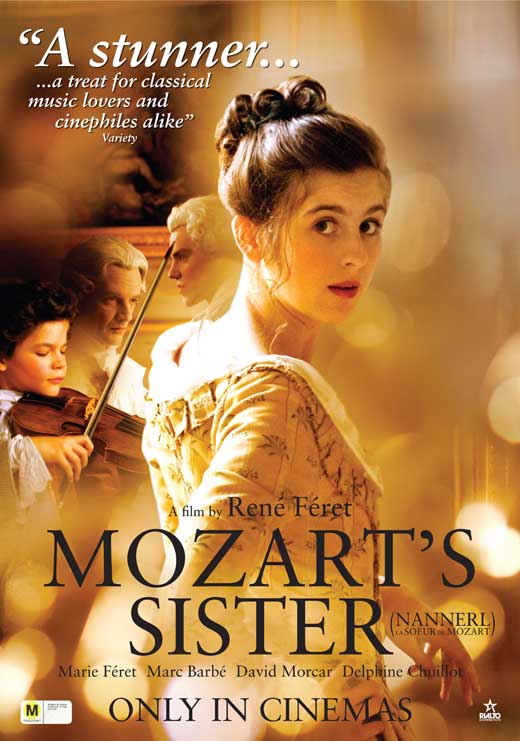
This weekend in my movie class, we had a bonus screening of the French drama “Mozart’s Sister”.
Synopsis
When Wolfgang Mozart gains a reputation throughout Europe as a child musical prodigy in the 1700’s, his fame begins to outshine his talented older sister – but will she be able to carve out her own niche as a musician?
Story
Leopold Mozart was blessed with two musically gifted children – his daughter Maria-Anna (nicknamed Nannerl) and his son Wolfgang. Under his tutelage, both children exhibited amazing talents early on, to the point that Leopold would pack up his family and drag them all around Europe to entertain various heads of state in the hope that it would bring them fame and wealth. Nannerl was a singer, violinist and harpsichord player; her younger brother played the violin and also composed music – his first composition coming at the age of five, earning him the title of prodigy.
Wolfgang’s notoriety is building at the expense of Nannerl, who is now being overshadowed by her younger brother. With aspirations to play the violin and compose like her sibling, Nannerl’s abilities are being slowly smothered by her own father, who believes that his time is best spent promoting his son. In addition, Leopold thinks that women should neither play the violin nor compose music because this is a male-dominated domain. With a burning ambition that only increases the more she plays music with Wolfgang, Nannerl becomes frustrated and sets out on her own.
Opportunities for Nannerl are few and far between because she had the misfortune of being born the wrong sex during the 1700’s – in fact, she can’t even apply to study in the music academy because they don’t accept female students. Eventually, she becomes resigned to her fate and returns to the family to serve as her younger brother’s accompanist. However, the desire to compose and perform her own compositions still exist, despite the obstacles and rejection she encounters. Will Nannerl be able to achieve her professional goals or will she be forever destined to take a backseat to Wolfgang?
Review
First off, this is by no means intended to be an historically accurate portrayal of Nannerl’s life – according to the production notes that our instructor shared with us, none of her music survives, so it is impossible to compare her compositions to those of her famous younger brother. The movie was written, so the story goes, by piecing together what did remain from her time, the letters she wrote to friends and family and those that were written to her. From there, the filmmakers were able to craft a dramatic story to tell people about a little-known musical talent that was unfortunately lost to our culture centuries ago.
One would think that after the hit stage play and award winning movie “Amadeus” that the life of Wolfgang Mozart had pretty much been covered. Little did anyone know exactly how rich his life was for dramatic content. “Mozart’s Sister” will certainly appeal to women partly because of the feminist angle, but also due to the music, the ornate sets and costumes, which are lavish; there is also a romantic angle to the story, but in all likelihood, it was probably just a dramatic conceit rather than a true event. There are, however, aspects that may appeal to men as well; the movie gives you an insight into the internecine political squabbling that went on with royalty that is reminiscent of how many businesses may be run even to this day.
Ultimately, I’ll recommend this movie, but with a few small caveats. To begin with, the main story takes a while to get going because there is a long set up at the outset of the film; fortunately, the viewers are rewarded because this all winds up paying itself off later on in the movie. The movie is around two hours in length, but I was surprised how quickly the time went, once the rather long opening set up had completed. Also, this film is a French production, so both the dialog and, of course, the credits, are in French; the movie makes use of white subtitles to translate the dialog into English, but they are mostly fairly easy to read because they are superimposed over dark backgrounds.

No comments:
Post a Comment
Speak Your Piece, Beeyotch!